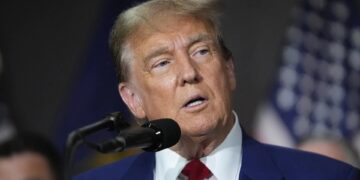Maryland Governor Wes Moore on Sunday criticized President Donald Trump’s tough talk on crime, calling it “purely performative” as the president suggested deploying federal troops to Baltimore.
Appearing on Face the Nation with Margaret Brennan, Moore said the president’s remarks amounted to political theater rather than real solutions.
“While the President is spending his time from the Oval Office making jabs and attacks at us, there are people actually on the ground doing the work who know what supports would actually work to continue to bring down crime. But it’s falling on deaf ears of the president of the United States,” Moore said.
Earlier this month, President Trump moved to federalize Washington, D.C.’s Metropolitan Police Department and deployed the National Guard to assist law enforcement in the nation’s capital despite data showing crime has been declining in recent years.
Trump said the effort “will go further,” adding that the administration was “starting very strongly with D.C.” and hinting at potential crackdowns in other cities, including Chicago, Los Angeles, New York City, Baltimore, and Oakland.
The president has unique authority over the D.C. National Guard because the district is under federal jurisdiction. However, expanding the move to states would require cooperation from governors or potentially spark legal challenges.
Governor Moore, a Democrat, has invited the president to join him on a public safety walk in Maryland, while highlighting his administration’s investments in local policing and community safety. Baltimore has recorded a 22% decrease in homicides in 2025 compared to the previous year, according to the Baltimore Police Department.
“The reason that I asked the president to come and join us is because he seems to enjoy living in this blissful ignorance, these tropes and these 1980s scare tactics,” Moore said.
He added: “We know we have work to do. If one person does not feel safe in their neighborhood, that’s one too many. But we also know what tactics actually work, and what tactics is just theatrics.”
Moore also rejected any suggestion that he would allow Maryland’s National Guard to be deployed for Trump’s initiative.
“There is a multitude of reasons that I am against this, and I will not authorize the Maryland National Guard to be utilized for this,” he said, arguing the operation is “not scalable,” “not sustainable,” and “deeply disrespectful” to service members.
On Sunday morning, before Moore’s television appearance, Trump lashed out at the governor on Truth Social.
“As President, I would much prefer that he clean up this Crime disaster before I go there for a ‘walk,’” Trump posted, claiming Moore’s record on crime was “very bad” unless he was “fudging figures.”
The president added: “If Wes Moore needs help, like Gavin Newscum did in L.A., I will send in the ‘troops,’ which is being done in nearby D.C., and quickly clean up the Crime.”
Trump has recently escalated his use of federal troops in cities. In June, he deployed the National Guard to Los Angeles during protests over immigration raids, a move that prompted a lawsuit from California Governor Gavin Newsom, who labeled it an illegal “power grab.”
Moore argued that the president’s tactics represent a short-term political maneuver rather than a long-term solution to urban crime.
“I refuse to continue doing this and not putting the proper resources in place, and not being able to put a real focus on making our communities safer,” Moore said, recalling his response to a mass shooting in Baltimore earlier in his tenure.
He warned that Trump’s crime operation in D.C. cannot be replicated across other major cities:
“You’re not going to be able to do this in every single major American city. It’s unconstitutional and it’s not sustainable.”
For Moore, the focus should be on community investment, smarter policing, and public trust, not military deployments. “It is so frustrating when we’re hearing from the president of the United States something that is just purely performative, without actually focusing on these communities and these neighborhoods who believe that progress is possible,” the governor said.































